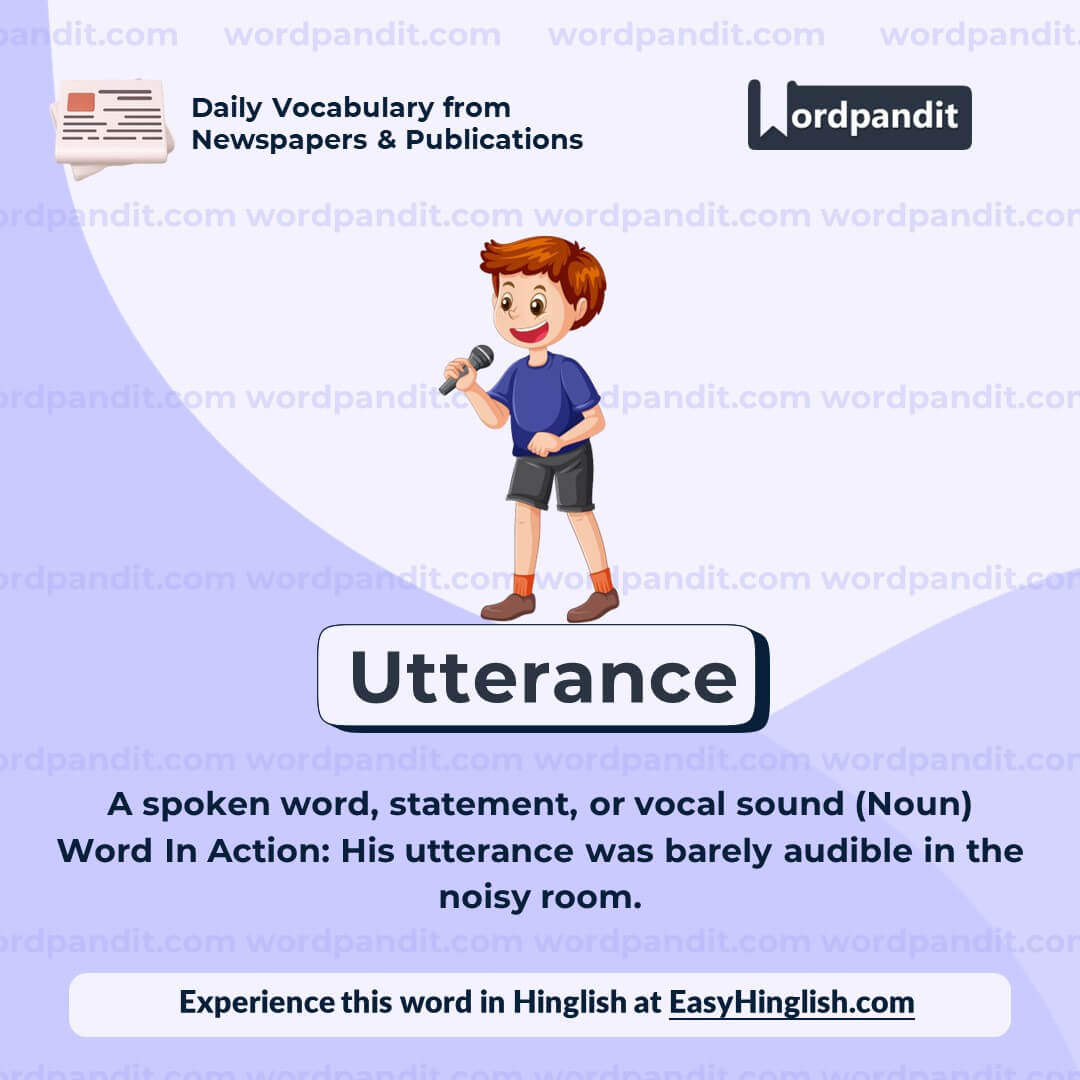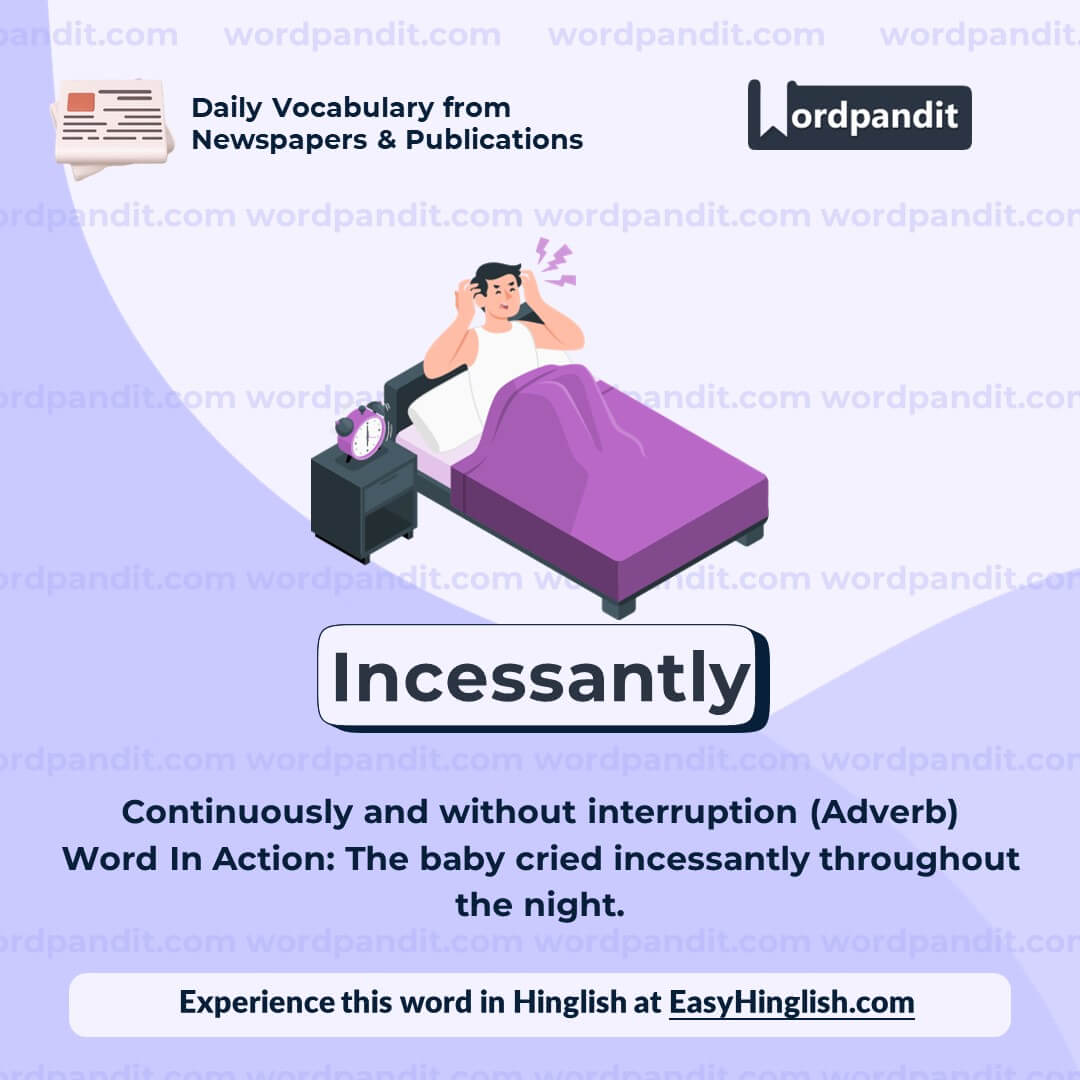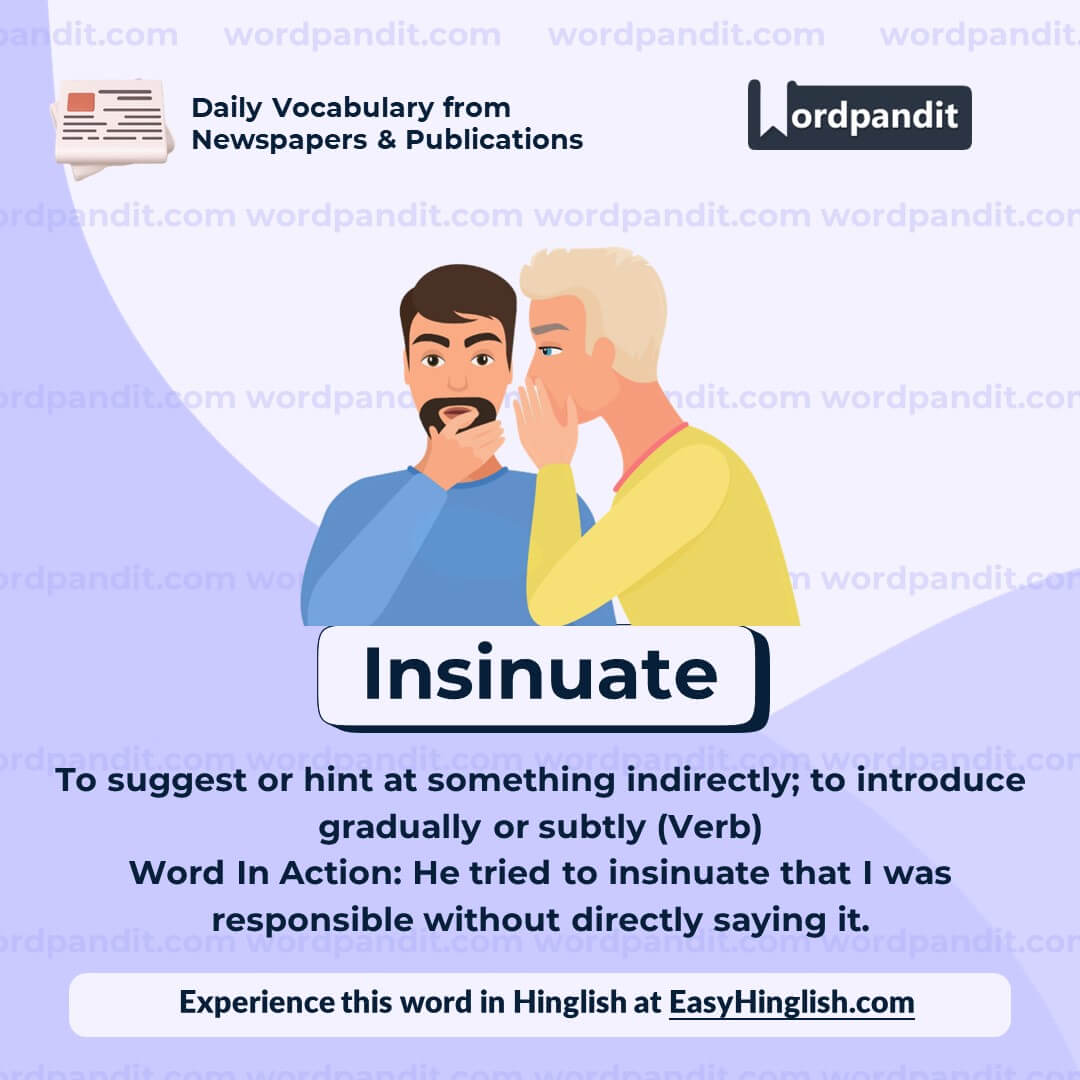Daily Vocabulary from International Newspapers and Publications
Expand Your Vocabulary with Wordpandit’s Global Vocabulary Hub
At Wordpandit, we are committed to helping you develop a truly global vocabulary by drawing from some of the most respected international publications. This section is designed to keep you ahead of the curve by introducing you to words that define global conversations and trends.
The Power of Global Sources
To help you think and communicate on a global scale, we curate vocabulary from renowned international sources, such as:
- The New York Times
- The Washington Post
- BBC
- The Guardian
- The Economist
- Scientific American
- Psychology Today
- And many more...
Stay Global, Stay Competitive
Our daily updates from international publications ensure you are consistently exposed to new words that reflect global news and developments, making sure your vocabulary is not only current but also globally relevant.
Enhance Your Global Perspective
Whether you’re preparing for international exams, aiming to excel in global business communication, or want to enhance your language skills for personal growth, Wordpandit offers the resources you need to thrive in a global context.
Effective Learning, Global Reach
Our learning methodology combines global examples, memory aids, and interactive activities, allowing you to internalize new words effectively and apply them in real-world scenarios.
Begin Your Global Vocabulary Journey Now!
Why Choose Wordpandit?
Practical Learning: Focus on words you'll actually encounter in real-world reading, enhancing your comprehension and communication skills.
Diverse Content: From current affairs to scientific breakthroughs, our varied sources expose you to vocabulary across multiple domains.
Effortless Integration: Make Wordpandit a part of your daily routine. Just a few minutes each day can significantly boost your lexicon over time.
Your Path to Vocabulary Mastery
- Visit our Daily Vocabulary section regularly
- Explore new words and their usage in context
- Practice incorporating these words into your own writing and speech
- Track your progress as your vocabulary expands
Start Your Journey Today
Embark on your vocabulary enhancement journey with Wordpandit. By consistently engaging with our daily posts, you'll build a robust vocabulary that serves you well in academic, professional, and personal contexts.
Remember, a word a day keeps linguistic limitations at bay. Make Wordpandit your daily companion in the quest for vocabulary excellence!
WORD-1: Utterance
Context:
"This utterance achieves several different effects." - Psyche
Explanatory Paragraph:
The word "utterance" refers to something that is spoken aloud, whether it's a word, phrase, or complete sentence. It emphasizes the act of speaking rather than just the written form of language. In contexts like psychology, linguistics, or literature, "utterance" often carries subtle meanings, such as tone, intention, and effect on the listener. It’s not just what is said, but how and why it’s said that matters.
Meaning: A spoken word, statement, or vocal sound (Noun)
Pronunciation: UHT-er-uhns
Difficulty Level: ⭐⭐ Beginner
Etymology: From Middle English "uteren" (to utter) + "-ance" (forming nouns of action)
Prashant Sir's Notes:
"Utterance" often appears in discussions around communication theory and language use. Remember: it refers to the act of speaking, not just the content.
Synonyms & Antonyms:
Synonyms: statement, remark, comment, expression, declaration
Antonyms: silence, quiet, hush, mute response
Usage Examples:
- His final utterance before leaving the room stunned everyone into silence.
- Each utterance she made carried a depth of emotion that resonated with the audience.
- The judge noted that the utterance could be taken as a threat in legal terms.
- Children’s first utterances are often simple but deeply meaningful.
Cultural Reference:
"Let your utterances be few." — This phrase, derived from the Bible (Ecclesiastes 5:2), emphasizes the value of thoughtful speech. - Biblical Literature
Think About It:
How does the tone or emotion behind an utterance change its meaning, even if the words remain the same?
Quick Activity:
Think of five common utterances used in your daily life (e.g., greetings or expressions of emotion). Write them down and analyze what emotions or intentions they carry.
Memory Tip:
Think of "utterance" as something you "utter" out loud — anything you say aloud is an utterance.
Real-World Application:
Understanding the concept of utterance is essential in fields like law, linguistics, therapy, and public speaking, where the manner and context of speech can have significant implications.
WORD-2: Miraculous
Context:
"This is a near-miraculous use of language." - Psyche
Explanatory Paragraph:
The word "miraculous" is used to describe something that is so extraordinary or amazing that it seems to defy the natural order — as if it were caused by a miracle. It often carries a sense of awe, wonder, and sometimes spiritual significance. When something is described as miraculous, it implies that it is highly unlikely or even impossible under normal circumstances.
Meaning: Highly extraordinary or supernatural; seeming to result from a miracle (Adjective)
Pronunciation: mih-RAK-yuh-luhs
Difficulty Level: ⭐⭐ Beginner
Etymology: From Latin "miraculum" meaning "object of wonder," from "mirari" meaning "to wonder at"
Prashant Sir's Notes:
Use "miraculous" when something happens against all odds or has a sense of divine or unbelievable quality. It works well both in literal and metaphorical contexts.
Synonyms & Antonyms:
Synonyms: amazing, extraordinary, phenomenal, supernatural, wondrous
Antonyms: ordinary, normal, mundane, expected, natural
Usage Examples:
- Her recovery from the accident was nothing short of miraculous.
- The team pulled off a miraculous comeback in the final seconds of the match.
- The child’s ability to memorize entire books at age five was considered miraculous by many.
- It was a miraculous sunset, painting the sky in shades of gold and crimson.
Cultural Reference:
"The miraculous birth of Christ" is a central theme in Christianity, symbolizing divine intervention and hope. - Christian Theology
Think About It:
What distinguishes a "miraculous" event from one that is simply "amazing"? Is belief a key factor?
Quick Activity:
Write down two events from your life or history that could be described as "miraculous." Then explain why you chose that word for them.
Memory Tip:
Remember that "miraculous" comes from "miracle" — so if it feels like a miracle, it's miraculous!
Real-World Application:
"Miraculous" is often used in journalism, storytelling, and motivational speech to highlight events that inspire awe — like survival stories, scientific breakthroughs, or incredible athletic feats.
WORD-3: Incessantly
Context:
"Most people produce them incessantly, and often with effects just as rich as Romeo’s." - Psyche
Explanatory Paragraph:
"Incessantly" refers to something that happens continuously, without pause or interruption. It often carries a slightly negative connotation, especially when the repeated action is overwhelming, tiring, or excessive. In this context, it means that people constantly generate expressions, perhaps without even realizing their richness or depth—comparable to Shakespeare’s Romeo.
Meaning: Without stopping; continuously or constantly (Adverb)
Pronunciation: in-SESS-uhnt-lee
Difficulty Level: ⭐⭐⭐ Intermediate
Etymology: From Latin "in-" (not) + "cessare" (to cease or stop)
Prashant Sir's Notes:
“Incessantly” is great for describing behaviors or patterns that repeat without a break — think of someone talking, working, or worrying nonstop. Use it carefully; tone matters!
Synonyms & Antonyms:
Synonyms: constantly, endlessly, ceaselessly, perpetually, unremittingly
Antonyms: occasionally, intermittently, rarely, sporadically
Usage Examples:
- The dog barked incessantly throughout the night, disturbing the entire neighborhood.
- She checked her phone incessantly during the meeting, barely paying attention.
- Rain fell incessantly for three days, flooding the entire valley.
- He talked incessantly about his vacation, repeating the same stories over and over.
Cultural Reference:
In the novel *Crime and Punishment* by Dostoevsky, the protagonist’s thoughts run incessantly, reflecting his mental torment. - Russian Literature
Think About It:
What modern habits (like social media scrolling or checking notifications) might be described as happening incessantly? Are they always harmful?
Quick Activity:
Make a list of three things you or people around you do incessantly. Then consider: are these actions productive, neutral, or harmful?
Memory Tip:
Think of “in-cessantly” as “not-ceasing” — it helps recall that the action doesn’t stop.
Real-World Application:
"Incessantly" is frequently used in writing and speaking to emphasize the relentlessness of actions or events — like incessant noise, work, demands, or even creative output.
WORD-4: Exodus
Context:
"By Tuesday about 6,000 people – although some estimates put the exodus at nearly twice that – had followed suit, using any means available: planes, boats and even private yachts and pleasure launches." - The Guardian
Explanatory Paragraph:
The word "exodus" describes a large-scale departure of people from a place, often under difficult or urgent circumstances. It is commonly used when a significant group leaves a region, city, or country due to war, natural disaster, persecution, or economic hardship. In the given context, it refers to a massive movement of people trying to escape or relocate using every possible mode of transport, highlighting urgency and scale.
Meaning: A mass departure of people, especially emigrants (Noun)
Pronunciation: EK-suh-duhs
Difficulty Level: ⭐⭐⭐ Intermediate
Etymology: From Greek "exodos" meaning "a going out", from "ex-" (out) + "hodos" (way, path)
Prashant Sir's Notes:
Use "exodus" when describing the movement of a large group of people — often forced or voluntary migration. It has a slightly dramatic or historical tone and should be used thoughtfully.
Synonyms & Antonyms:
Synonyms: departure, evacuation, migration, flight, retreat
Antonyms: arrival, influx, return, immigration
Usage Examples:
- The sudden political unrest triggered an exodus of families from the city.
- There was a mass exodus from the coastal towns as the hurricane approached.
- The company faced an exodus of senior employees after the leadership change.
- Historical records speak of the great exodus of refugees during the war.
Cultural Reference:
The "Exodus" is a key narrative in the Bible, where Moses leads the Israelites out of slavery in Egypt — a foundational story in Jewish, Christian, and Islamic traditions. - Religious Texts
Think About It:
What factors drive large groups of people to leave a place in an exodus? Are these movements always rooted in crisis?
Quick Activity:
Look up three major historical exoduses (e.g., Partition of India, Syrian refugee crisis, Great Migration in the U.S.). Write down one sentence summarizing each.
Memory Tip:
Think “exit + us” = a large group of us exiting — that’s an exodus!
Real-World Application:
"Exodus" is often used in journalism, history, and humanitarian reports to describe mass movements due to conflict, climate change, or political instability.
WORD-5: Insinuate
Context:
"Thomas Hobbes called metaphor an ‘abuse of speech’, and John Locke wrote that metaphors are ‘for nothing else but to insinuate wrong ideas, move the passions, and thereby mislead the judgment’ – the vilest of sins, for these 17th-century Enlightenment thinkers." - Psyche
Explanatory Paragraph:
"Insinuate" refers to subtly or indirectly suggesting something, often something negative or unpleasant. Instead of stating it outright, the speaker may hint or imply an idea in a sneaky or clever way. In the context above, Locke criticizes metaphors for their potential to covertly implant misleading or emotional ideas in people’s minds—thus distorting judgment.
Meaning: To suggest or hint at something, often in an indirect or unpleasant way (Verb)
Pronunciation: in-SIN-yoo-ate
Difficulty Level: ⭐⭐⭐ Intermediate
Etymology: From Latin "insinuare," meaning "to introduce or bring in by windings or curves," from "in-" (in) + "sinuare" (to bend, curve)
Prashant Sir's Notes:
"Insinuate" is often used in contexts where manipulation or persuasion is involved. Be careful — it usually implies a subtle, sometimes sneaky insertion of ideas into someone’s mind.
Synonyms & Antonyms:
Synonyms: imply, suggest, hint, allude, intimate
Antonyms: state, declare, assert, proclaim, announce
Usage Examples:
- She didn’t accuse him directly but managed to insinuate that he was to blame.
- The article seemed to insinuate corruption within the organization without providing evidence.
- He tried to insinuate himself into their group by constantly agreeing with everyone.
- The lawyer insinuated that the witness might have a hidden agenda.
Cultural Reference:
In Shakespeare’s *Othello*, Iago masterfully insinuates false ideas into Othello’s mind, leading to tragic consequences — a classic example of manipulation through subtle suggestion. - English Literature
Think About It:
Is insinuation always manipulative, or can it be a useful tool in certain kinds of communication, like diplomacy or storytelling?
Quick Activity:
Write two sentences: one that directly states a fact, and another that insinuates the same idea. Compare how each feels and why one might be more persuasive or subtle.
Memory Tip:
Think of "insinuate" as “sneaky suggestion” — it slithers into your thoughts without saying it openly.
Real-World Application:
"Insinuate" is common in political discourse, journalism, legal arguments, and fiction writing — often when someone wants to influence perception without directly making accusations or claims.



















